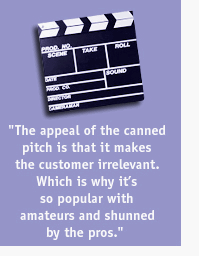
Phony Phrases to Avoid
| Продажи | ||||
| Sales.com | ||||
| Making... | ||||
by Graham Denton
Scripted pitches always have been a mainstay of unimaginative sales teams, because they present the illusion of quality control. If you stick to a well-crafted script (so goes the theory), you can steer the conversation in the direction you want it to go even if you haven't a clue about what your prospect is thinking. All you have to do is to tick off the prepackaged agenda -- including the prepackaged answers to every conceivable question or objection -- until the customer is directed, as if by magic, to the foregone conclusion. You walk away from the encounter feeling somehow gratified that, even if the customer somehow wiggles out, you have read your part well.
 Not
the least of the many difficulties with this brainless exercise is that
you risk appearing to the customer as -- guess what? -- insincere. Because
of course you are. If you're following a prewritten script along a prearranged
track, it follows that you not only don't, but can't, value what the customer
may be thinking. The great appeal of the canned sales pitch is that it
makes the customer irrelevant. Which is why it's so popular with amateurs,
and shunned by the pros.
Not
the least of the many difficulties with this brainless exercise is that
you risk appearing to the customer as -- guess what? -- insincere. Because
of course you are. If you're following a prewritten script along a prearranged
track, it follows that you not only don't, but can't, value what the customer
may be thinking. The great appeal of the canned sales pitch is that it
makes the customer irrelevant. Which is why it's so popular with amateurs,
and shunned by the pros.
How does a scripted pitch make you sound insincere? Ironically, by its lame use of the very "personalizations" that the writers of these monologues claim will make you sound genuine! Here are three of the most glaring examples.
The "Selection" Ploy. This is one of telemarketing's most widely utilized, and most irritating, opening gambits. "Mr. Jones, because of your excellent credit record, you have been selected to receive a free 90 day supply of_" Somewhere in the backwoods, no doubt, there is a Mr. Jones who is dim enough to buy this line, but most prospects today are not nearly this gullible. They know that they've been selected because they're number 473 on a list of 500, and they see the "selection" ploy as unrefined soft-soaping. The last thing it makes the salesperson appear is tuned in to the prospect.
The Rhetorical Tag. This is a closed question, that is, one that demands a Yes answer, that you're supposed to add to the end of a sentence to enlist "cooperation." "Ms. Richards, I'm sure you'd agree that it would be nice to have a nest egg for retirement, wouldn't you?" The idea is that, once Ms. Richards says Yes (because why would anybody say No?), you've established momentum for her to keep "agreeing" with you, have made her, in effect, a partner in your conversation. Tom Hopkins calls such rhetorical tags "tie down questions," because they serve to tie down the customer's attention, and he claims that you shouldn't think of them as manipulative. Why not? They are -- aren't they?
The "Sweetest Sound" Technique. Dale Carnegie said sixty years ago that the sweetest sound any person can hear is the sound of his or her own name. Building on that piece of vintage hokum, salespeople have for years been peppering their pitches with the customer's name, often in inappropriate places. Maybe it helps them remember whom they're talking to, but it seldom comes off as anything but an irksome verbal tic. Greet your customer by name, to be sure -- and use that sweet sound again when you're leaving his office. In between, make the assumption that he knows who he is.
Of course, any or all of these techniques can be effective, if they come naturally to your speech style and if you use them sparingly. But their purpose, remember, is to help you establish rapport with the customer. If they sound like you've learned them from a book -- even one by Dale Carnegie or Tom Hopkins -- the sincerity game is over.